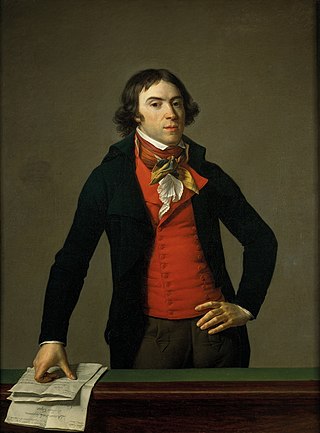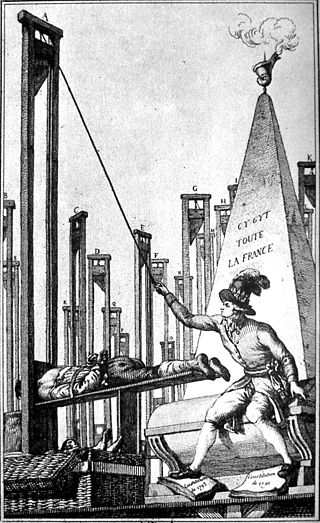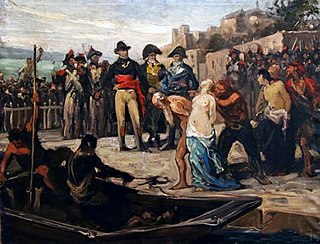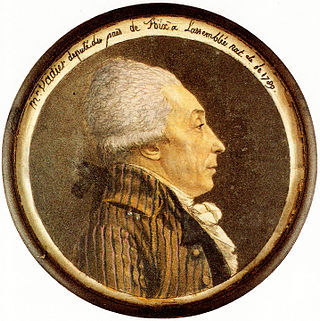Related Research Articles

The Reign of Terror was a period of the French Revolution when, following the creation of the First Republic, a series of massacres and numerous public executions took place in response to revolutionary fervour, anticlerical sentiment, and accusations of treason by the Committee of Public Safety. While terror was never formally instituted as a legal policy by the Convention, it was more often employed as a concept.

Bertrand Barère de Vieuzac was a French politician, freemason, journalist, and one of the most prominent members of the National Convention, representing the Plain during the French Revolution. The Plain was dominated by the radical Montagnards and Barère as one of their leaders supported the foundation of the Committee of Public Safety in April and of a sans-culottes army in September 1793. According to Francois Buzot, Barère was responsible for the Reign of Terror, like Robespierre and Louis de Saint-Just. In spring 1794 and after the Festival of the Supreme Being, he became an opponent of Maximilien Robespierre and joined the coup, leading to his downfall.

The Committee of Public Safety was a committee of the National Convention which formed the provisional government and war cabinet during the Reign of Terror, a violent phase of the French Revolution. Supplementing the Committee of General Defence, created early January 1793, the Committee of Public Safety was created on 6 April 1793 by the National Convention. It was charged with protecting the new republic against its foreign and domestic enemies, fighting the First Coalition and the Vendée revolt. As a wartime measure, the committee was given broad supervisory and administrative powers over the armed forces, judiciary and legislature, as well as the executive bodies and ministers of the convention.

The National Convention was the constituent assembly of the Kingdom of France for one day and the French First Republic for its first three years during the French Revolution, following the two-year National Constituent Assembly and the one-year Legislative Assembly. Created after the great insurrection of 10 August 1792, it was the first French government organized as a republic, abandoning the monarchy altogether. The Convention sat as a single-chamber assembly from 20 September 1792 to 26 October 1795.

Jacques-Nicolas Billaud-Varenne, also known as Jean Nicolas or by his nicknames, the Righteous Patriot or the Tiger, was a French lawyer and a major figure in the French Revolution. A close associate of Georges Danton and Maximilien Robespierre, he was one of the most militant members of the Committee of Public Safety, and is often considered a key architect of the Reign of Terror.

Jean-Lambert Tallien was a French politician of the revolutionary period. Though initially an active agent of the Reign of Terror, he eventually clashed with its leader, Maximilien Robespierre, and is best known as one of the key figures of the Thermidorian Reaction that led to the fall of Robespierre and the end of the Terror.

The Law of 22 Prairial, also known as the loi de la Grande Terreur, the law of the Great Terror, was enacted on 10 June 1794. It was proposed by Georges Auguste Couthon but seems to have been written by Maximilien Robespierre according to Laurent Lecointre. Using this law, the Committee of Public Safety simplified the judicial process to one of indictment and prosecution.

The Constitution of the Year VIII was a national constitution of France, adopted on 24 December 1799, which established the form of government known as the Consulate. The coup of 18 Brumaire had effectively given all power to Napoleon Bonaparte, and in the eyes of some, ended the French Revolution.
The Commission nationale de l'informatique et des libertés is an independent French administrative regulatory body whose mission is to ensure that data privacy law is applied to the collection, storage, and use of personal data. Its existence was established by the French loi n° 78-17 on Information Technology, Data Files and Civil Liberty of 6 January 1978, and it is the national data protection authority for France. From September 2011 to February 2019, the CNIL has been chaired by Isabelle Falque-Pierrotin. It's now chaired by Marie-Laure Denis.

The Committee of General Security was a parliamentary committee of the French National Convention which acted as police agency during the French Revolution. Established as a committee of the Convention in October 1792, it was designed to protect the Revolutionary Republic from internal enemies. Along with the Committee of Public Safety it oversaw the Reign of Terror. The Committee of General Security supervised the local police committees in charge of investigating reports of treason, and was one of the agencies with authority to refer suspects to the Revolutionary Tribunal for trial and possible execution by guillotine. In 1794 the committee was involved in the arrest and execution of Maximilien Robespierre and several of his political allies on 9 Thermidor. On 4 November 1795, along with the end of the National Convention, the Committee of General Security dissolved.

The Revolutionary Tribunal was a court instituted by the National Convention during the French Revolution for the trial of political offenders. In October 1793, it became one of the most powerful engines of the period often called the Reign of Terror.

The drownings at Nantes were a series of mass executions by drowning during the Reign of Terror in Nantes, France, that occurred between November 1793 and February 1794. During this period, anyone arrested and jailed for not consistently supporting the Revolution, or suspected of being a royalist sympathizer, especially Catholic priests and nuns, were cast into the river Loire and drowned on the orders of Jean-Baptiste Carrier, the representative-on-mission in Nantes. Before the drownings ceased, as many as four thousand or more people, including innocent families with women and children, died in what Carrier himself called "the national bathtub".

Marc-Guillaume Alexis Vadier was a major French politician of the French Revolution. He is sometimes called the "Great Inquisitor", for his active participation in the Reign of Terror.

The National Gendarmerie is one of two national law enforcement forces of France, along with the National Police. The Gendarmerie is a branch of the French Armed Forces placed under the jurisdiction of the Ministry of the Interior, with additional duties from the Ministry of Armed Forces. Its responsibilities include policing smaller towns, suburbs and rural areas, crowd and riot control, and criminal investigation, including cybercrime. By contrast, the National Police is a civilian law enforcement agency that is in charge of policing cities and larger towns. Because of its military status, the Gendarmerie also fulfills a range of military and defence missions. The Gendarmerie has a strength of around 102,269 people.
The Bulletin des lois was a French government gazette published between 1794 and 1931.

The politics of France take place within the framework of a semi-presidential system determined by the French Constitution of the French Fifth Republic. The nation declares itself to be an "indivisible, secular, democratic, and social Republic". The constitution provides for a separation of powers and proclaims France's "attachment to the Rights of Man and the principles of National Sovereignty as defined by the Declaration of 1789".
Jean Joseph Victor Génissieu was a French lawyer and politician who was in turn president of the National Convention, Minister of Justice and president of the Council of Five Hundred during the French Revolution.

Dominique-Vincent Ramel was a French lawyer and politician who became Minister of Finance under the French Directory. He was an energetic reformer, but was blamed for many of the financial problems of the time, and went into retirement during the French Consulate and First French Empire. He supported Napoleon during the Hundred Days of 1815. After the second Bourbon Restoration, as a regicide he was forced into exile in Belgium, where he died without returning to France.

Jean-Marie Calès was a French physician and left-wing politician amid the French Revolution. He was born in Cessales, Haute-Garonne and died in Liège, Belgium.
Gilbert-Amable Faure-Conac, was a French Navy officer and politician who served in the American Revolutionary War and the French Revolutionary and Napoleonic Wars.
References
- 1 2 3 Roswell., Palmer, Robert (1958). Twelve who ruled. OCLC 163776553.
{{cite book}}: CS1 maint: multiple names: authors list (link) - ↑ Fenwick, Jill; Anderson, Judy (1 October 2005). Revolution: France. History Teachers' Association of Victoria. ISBN 9781875585588.